25 start with C start with C
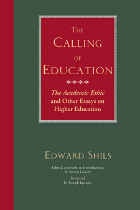
Edward Shils understood the university as a great symphonic conductor comprehends the value of each instrument and section, both separately and in cooperation. The Calling of Education offers Shils's insightful perspective on problems that are no less pressing than when he first confronted them.
Edward Shils (1910-1995) was distinguished service professor in the Committee on Social Thought and the department of sociology at the University of Chicago. Among his many books published by the University of Chicago Press are Portraits: A Gallery of Intellectuals and the three-volume Selected Papers of Edward Shils.
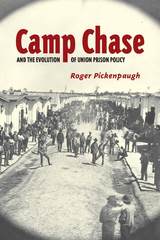
Camp Chase was a major Union POW camp and also served at various times as a Union military training facility and as quarters for Union soldiers who had been taken prisoner by the Confederacy and released on parole or exchanged. As such, this careful, thorough, and objective examination of the history and administration of the camp will be of true significance in the literature on the Civil War.
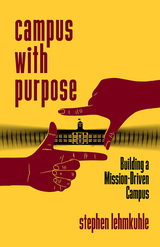
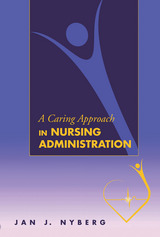
Jan Nyberg, an experienced nursing administrator, scholar, and educator, knows another way-from the inside out rather than the outside in. She brings forth her wisdom and knowledge, experiences, and insights so that others may now grasp another way to transform systems for delivery of human caring and healing. This work informs, instructs, and inspires; it invites nurse leaders and other health administrators to reach for what might be, rather than succumbing to what already is.
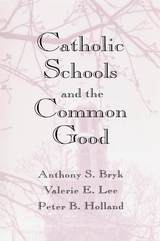

While tracing the socioeconomic conditions that have led to the present labor situation on campuses, the contributors consider such topics as the political implications of managerialism and the conceptual status of academic labor.
They examine the trend toward restructuring and downsizing, the particular plight of the adjunct professor, the growing emphasis on vocational training in the classroom, and union organizing among university faculty, staff, and graduate students. Placing such issues within the context of the history of labor movements as well as governmental initiatives to train a workforce capable of competing in the global economy, Chalk Lines explores how universities have attempted to remake themselves in the image of the corporate sector. Originally published as an issue of Social Text, this expanded volume, which includes four new essays, offers a broad view of academic labor in the United States.
With its important, timely contribution to debates concerning the future of higher education, Chalk Lines will interest a wide array of academics, administrators, policymakers, and others invested in the state—and fate—of academia.
Contributors. Stanley Aronowitz, Jan Currie, Zelda F. Gamson, Emily Hacker, Stefano Harney, Randy Martin, Bart Meyers, David Montgomery, Frederick Moten, Christopher Newfield, Gary Rhoades, Sheila Slaughter, Jeremy Smith, Vincent Tirelli, William Vaughn, Lesley Vidovich, Ira Yankwitt



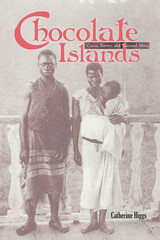
In Chocolate Islands: Cocoa, Slavery, and Colonial Africa, Catherine Higgs traces the early-twentieth-century journey of the Englishman Joseph Burtt to the Portuguese colony of São Tomé and Príncipe—the chocolate islands—through Angola and Mozambique, and finally to British Southern Africa. Burtt had been hired by the chocolate firm Cadbury Brothers Limited to determine if the cocoa it was buying from the islands had been harvested by slave laborers forcibly recruited from Angola, an allegation that became one of the grand scandals of the early colonial era. Burtt spent six months on São Tomé and Príncipe and a year in Angola. His five-month march across Angola in 1906 took him from innocence and credulity to outrage and activism and ultimately helped change labor recruiting practices in colonial Africa.
This beautifully written and engaging travel narrative draws on collections in Portugal, the United Kingdom, and Africa to explore British and Portuguese attitudes toward work, slavery, race, and imperialism. In a story still familiar a century after Burtt’s sojourn, Chocolate Islands reveals the idealism, naivety, and racism that shaped attitudes toward Africa, even among those who sought to improve the conditions of its workers.

Chronic Condition provides a compelling analysis of the causes of the current health care crisis and of the shortcomings of reform proposals. It also offers an ingenious new framework for reform that, while minimizing government interference, would provide a means for financing care for the less affluent.
Sherry Glied shows that rising health care spending is consistent with a rising standard of living. Since we can, as a nation, afford more health care, reform must address not the overall level of health care costs but the distribution of health care spending.
Prior reform proposals, Glied argues, have failed to account for the tension between the clearly manifested desire for improving the quality of health care and the equally widespread interest in assuring that the less fortunate share in these improvements. After careful analysis of the ill-fated Clinton plan, Glied proposes a new solution that would make the willingness to pay for innovation the means of financing health care improvements for the less affluent. While rejecting the idea that the distribution of health care should be perfectly equal, Glied's proposal would enable all Americans to benefit from the dynamics of the free market.

Late one afternoon, as you are organizing your new office as department chair, one of the senior members of the department drops by. He affably informs you of his plans for the coming semester: that contrary to the published class schedule, he only teaches on Tuesday afternoon, Wednesday, and Thursday morning, so as to have the weekends free for travel; that he expects the office staff to start his coffeemaker by 10 a.m. sharp on his teaching days; and that since he hasn’t been assigned a research assistant, his teaching assistant will do research tasks, including errands. What do you say? What do you do?
Never mind budgets or curriculum reform: staff problems can be the most thorny of any academic administrator’s job. Every day, professors who have never run anything bigger than a seminar find themselves in charge of a complex and volatile organization called a Department of English (or Biology, or Sociology, or Textile Marketing). What should they do?
In this book, a widely respected advisor on academic administration and ethics offers tips, insights, and tools on handling complaints, negotiating disagreements, responding to accusations of misconduct, and dealing with difficult personalities. With humor and generosity, C. K. Gunsalus applies scenarios based on real-life cases, examples from negotiation, law, and child-rearing to guide novice (and experienced) academic administrators through the dilemmas of management in not-entirely-manageable environments.
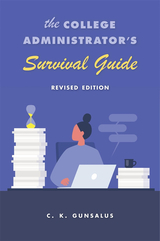
The book that every dean and department chair needs to survive—and thrive—in the twenty-first-century university.
First released in 2006, The College Administrator’s Survival Guide has served as the bible for a generation of provosts, deans, department chairs, and program directors. Shrewd administrators have returned to the guide time and again for C. K. Gunsalus’s advice on handling complaints, negotiating disagreements, and dealing with difficult personalities. Now, in this revised and updated edition, Gunsalus guides rookie administrators and seasoned veterans through today’s most pressing higher-education challenges.
These days academic leaders must respond to heightened demands for transparency and openness. These demands are intensified by social media, which increases the visibility of university conflicts and can foster widespread misinformation about campus affairs. Meanwhile, institutions have become flatter, with administrators expected to work more closely with faculty, students, and a range of professionals even as support staffs shrink. Between the ever-replenishing inbox, the integration of often-exasperating management systems into every dimension of academic life, and the new demands of remote learning, deans and department heads are juggling more balls than ever before. Tightening budgets have already forced administrators into more difficult choices and, in the wake of COVID-19, there will be no relief from financial constraints.
From #MeToo to partisan battles over curricula and funding, college and university leaders need more savvy and greater sensitivity than ever. What hasn’t changed are the challenges of dealing with difficult people and the importance of creating and maintaining environments in which faculty, staff, and students have the support they need to do their best work. The College Administrator’s Survival Guide provides the tools to keep cool and get the job done.
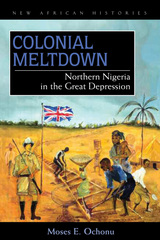
Historians of colonial Africa have largely regarded the decade of the Great Depression as a period of intense exploitation and colonial inactivity. In Colonial Meltdown, Moses E. Ochonu challenges this conventional interpretation by mapping the determined, at times violent, yet instructive responses of Northern Nigeria’s chiefs, farmers, laborers, artisans, women, traders, and embryonic elites to the British colonial mismanagement of the Great Depression. Colonial Meltdown explores the unraveling of British colonial power at a moment of global economic crisis.
Ochonu shows that the economic downturn made colonial exploitation all but impossible and that this dearth of profits and surpluses frustrated the colonial administration which then authorized a brutal regime of grassroots exactions and invasive intrusions. The outcomes were as harsh for Northern Nigerians as those of colonial exploitation in boom years.
Northern Nigerians confronted colonial economic recovery measures and their agents with a variety of strategies. Colonial Meltdown analyzes how farmers, women, laborers, laid-off tin miners, and NorthernNigeria’s emergent elite challenged and rebelled against colonial economic recovery schemes with evasive trickery, defiance, strategic acts of revenge, and criminal self-help and, in the process, exposed the weak underbelly of the colonial system.
Combined with the economic and political paralysis of colonial bureaucrats in the face of crisis, these African responses underlined the fundamental weakness of the colonial state, the brittleness of its economicmission, and the limits of colonial coercion and violence. This atmosphere of colonial collapse emboldened critics of colonial policies who went on to craft the rhetorical terms on which the anticolonial struggle of the post–World War II period was fought out.
In the current climate of global economic anxieties, Ochonu’s analysis will enrich discussions on the transnational ramifications of economic downturns. It will also challenge the pervasive narrative of imperial economic success.


Colonialism, Antisemitism, and Germans of Jewish Descent in Imperial Germany examines the relationship between the colonial and antisemitic movements of modern Germany from 1871 to 1918, examining the complicated ways in which German antisemitism and colonialism fed off of and into each other in the decades before the First World War. Author Christian S. Davis studies the significant involvement with and investment in German colonialism by the major antisemitic political parties and extra-parliamentary organizations of the day, while also investigating the prominent participation in the colonial movement of Jews and Germans of Jewish descent and their tense relationship with procolonial antisemites.
Working from the premise that the rise and propagation of racial antisemitism in late-nineteenth-century Germany cannot be separated from the context of colonial empire, Colonialism, Antisemitism, and Germans of Jewish Descent in Imperial Germany is the first work to study the dynamic and evolving interrelationship of the colonial and antisemitic movements of the Kaiserreich era. It shows how individuals and organizations who originated what would later become the ideological core of National Socialism---racial antisemitism---both influenced and perceived the development of a German colonial empire predicated on racial subjugation. It also examines how colonialism affected the contemporaneous German antisemitic movement, dividing it over whether participation in the nationalist project of empire building could furnish patriotic credentials to even Germans of Jewish descent. The book builds upon the recent upsurge of interest among historians of modern Germany in the domestic impact and character of German colonialism, and on the continuing fascination with the racialization of the German sense of self that became so important to German history in the twentieth century.
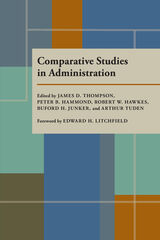
This volume is intended as a contribution to the study of administration. The contributors represent several branches of social and behavioral sciences, including anthropology, economics, industrial management, sociology, and social psychology. The data for the empirical studies were gathered in the United States, Germany, Great Britain, Norway, West Africa, and the Fox Indian society, and from different types of organizations, including manufacturing, mining, shipping, higher education, hospitals, the military, and social welfare agencies.
Contributors: Frederick L. Bates; Warren G. Bennis; Frank A. Cassell; Rose Laub Coser; William R. Dill; Frederick H. Harbison; Ernst Köchling; Walter B. Miller; Stephen A. Richardson; Heinrich C. Ruebmann; Edward J. Thomas; and the editors.

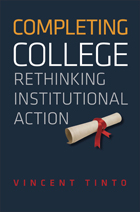
Even as the number of students attending college has more than doubled in the past forty years, it is still the case that nearly half of all college students in the United States will not complete their degree within six years. It is clear that much remains to be done toward improving student success. For more than twenty years, Vincent Tinto’s pathbreaking book Leaving College has been recognized as the definitive resource on student retention in higher education. Now, with Completing College, Tinto offers administrators a coherent framework with which to develop and implement programs to promote completion.
Deftly distilling an enormous amount of research, Tinto identifies the essential conditions enabling students to succeed and continue on within institutions. Especially during the early years, he shows that students thrive in settings that pair high expectations for success with structured academic, social, and financial support, provide frequent feedback and assessments of their performance, and promote their active involvement with other students and faculty. And while these conditions may be worked on and met at different institutional levels, Tinto points to the classroom as the center of student education and life, and therefore the primary target for institutional action.
Improving retention rates continues to be among the most widely studied fields in higher education, and Completing College carefully synthesizes the latest research and, most importantly, translates it into practical steps that administrators can take to enhance student success.
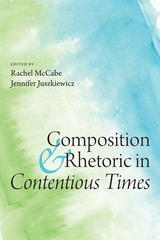
Editors Rachel McCabe and Jennifer Juszkiewicz consider how educators can respond to multiple current crises relating to composition and rhetoric with generosity and cautious optimism; in the process, they address the current concerns about the longevity of the humanities. By engaging with social constructivist, critical race, socioeconomic, and activist pedagogies, each chapter provides an answer to the question, How can our courses help students become stronger writers while contending with current social, environmental, and ethical questions posed by the world around them? The contributors consider this question from numerous perspectives, recognizing the important ways that power and privilege affect our varying means of addressing this question.
Relying on both theory and practice, Composition and Rhetoric in Contentious Times engages the future of composition and rhetoric as a discipline shaped by recent and current global events. This text appeals to early-career writing program administrators, writing center directors, and professional specialists, as well as Advanced Placement high school instructors, graduate students, and faculty teaching graduate-level pedagogy courses.
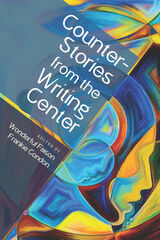
Practicing what Derrick Bell has termed “creative truth telling,” these writers are not concerned with individual white women in writing centres but with the social, political, and cultural capital that is the historical birthright of white, straight, cis-gendered women, particularly in writing centre studies. The essays collected in this volume test, defy, and overflow the bounds of traditional academic discourse in the service of powerful testimony, witness, and counterstory.
CounterStories from the Writing Center is a must-read for writing centre directors, scholars, and tutors who are committed to antiracist pedagogy and offers a robust intersectional analysis to those who seek to understand the relationship between the work of writing centres and the problem of racism. Accessible and usable for both graduate and undergraduate students of writing centre theory and practice, this work troubles the field’s commonplaces and offers a rich envisioning of what writing centres materially committed to inclusion and equity might be and do.
Contributors: Dianna Baldwin, Nicole Caswell, Mitzi Ceballos, Romeo Garcia, Neisha-Anne Green, Doug Kern, T. Haltiwanger Morrison, Bernice Olivas, Moira Ozias, Trixie Smith, Willow Trevino
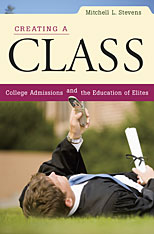
In real life, Mitchell Stevens is a professor in bustling New York. But for a year and a half, he worked in the admissions office of a bucolic New England college that is known for its high academic standards, beautiful campus, and social conscience. Ambitious high schoolers and savvy guidance counselors know that admission here is highly competitive. But creating classes, Stevens finds, is a lot more complicated than most people imagine.
Admissions officers love students but they work for the good of the school. They must bring each class in "on budget," burnish the statistics so crucial to institutional prestige, and take care of their colleagues in the athletic department and the development office. Stevens shows that the job cannot be done without "systematic preferencing," and racial affirmative action is the least of it. Kids have an edge if their parents can pay full tuition, if they attend high schools with exotic zip codes, if they are athletes--especially football players--and even if they are popular.
With novelistic flair, sensitivity to history, and a keen eye for telling detail, Stevens explains how elite colleges and universities have assumed their central role in the production of the nation's most privileged classes. Creating a Class makes clear that, for better or worse, these schools now define the standards of youthful accomplishment in American culture more generally.
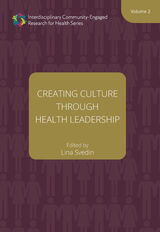
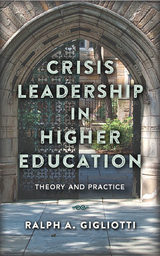
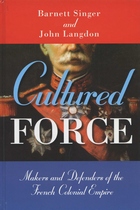
READERS
Browse our collection.
PUBLISHERS
See BiblioVault's publisher services.
STUDENT SERVICES
Files for college accessibility offices.
UChicago Accessibility Resources
home | accessibility | search | about | contact us
BiblioVault ® 2001 - 2024
The University of Chicago Press









